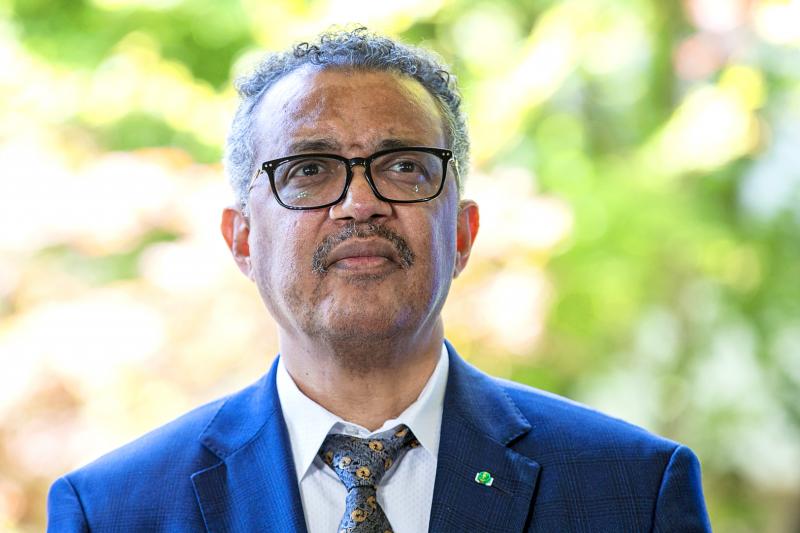Six months on from the novel coronavirus outbreak, the WHO on Monday said it was sending a team to China to work toward finding the source — as it warned the pandemic was far from over.
The WHO also warned that in an atmosphere of global division and solicitation of the COVID-19 crisis, it feared the worst was yet to come.
The UN health agency lamented the “very tragic” milestones of 500,000 deaths and 10 million confirmed infections being reached.

Photo: AP
Yesterday also marked six months since the WHO was first informed of the outbreak in the Chinese city of Wuhan.
The WHO is sending a team to China next week in connection with the search for the origin of the virus that sparked the global pandemic.
The organization has been pressing China since early May to invite in its experts to help investigate the animal origins of the virus.
“We can fight the virus better when we know everything about the virus, including how it started,” WHO director-general Tedros Adhanom Ghebreyesus told a virtual news conference. “We will be sending a team next week to China to prepare for that, and we hope that that will lead into understanding how the virus started.”
He did not specify the makeup of the team, or what their mission would specifically consist of.
Scientists believe the virus jumped from animals to humans, possibly from a market in Wuhan selling exotic animals for meat.
“Six months ago, none of us could have imagined how our world — and our lives — would be thrown into turmoil by this new virus,” Tedros said.
“We all want this to be over. We all want to get on with our lives, but the hard reality is this is not even close to being over,” he said. “Globally the pandemic is actually speeding up. We’re all in this together, and we’re all in this for the long haul. We have already lost so much — but we cannot lose hope.”
Tedros also said that the pandemic had brought out the best and worst humanity, citing acts of kindness and solidarity, but also misinformation and the politicization of the virus.
Unless international unity replaces fractious division, “the worst is yet to come. I’m sorry to say that,” Tedros said.
“With this kind of environment and condition, we fear the worst,” he added.
While the world races to find safe and effective vaccines and therapeutics against COVID-19, Tedros said that countries such as South Korea had shown that the virus could be successfully suppressed and controlled without them.
He said that governments needed to be “serious” about measures such as contact tracing, and citizens had to take responsibility for personal steps such as maintaining hand hygiene.
Reflecting on the global death toll and infection numbers, Tedros said: “Still, this could have been prevented through the tools we have at hand.”
“The critical question that all countries will face in the coming months is how to live with this virus. That is the new normal,” he added.

Kehinde Sanni spends his days smoothing out dents and repainting scratched bumpers in a modest autobody shop in Lagos. He has never left Nigeria, yet he speaks glowingly of Burkina Faso military leader Ibrahim Traore. “Nigeria needs someone like Ibrahim Traore of Burkina Faso. He is doing well for his country,” Sanni said. His admiration is shaped by a steady stream of viral videos, memes and social media posts — many misleading or outright false — portraying Traore as a fearless reformer who defied Western powers and reclaimed his country’s dignity. The Burkinabe strongman swept into power following a coup in September 2022

‘FRAGMENTING’: British politics have for a long time been dominated by the Labor Party and the Tories, but polls suggest that Reform now poses a significant challenge Hard-right upstarts Reform UK snatched a parliamentary seat from British Prime Minister Keir Starmer’s Labor Party yesterday in local elections that dealt a blow to the UK’s two establishment parties. Reform, led by anti-immigrant firebrand Nigel Farage, won the by-election in Runcorn and Helsby in northwest England by just six votes, as it picked up gains in other localities, including one mayoralty. The group’s strong showing continues momentum it built up at last year’s general election and appears to confirm a trend that the UK is entering an era of multi-party politics. “For the movement, for the party it’s a very, very big

ENTERTAINMENT: Rio officials have a history of organizing massive concerts on Copacabana Beach, with Madonna’s show drawing about 1.6 million fans last year Lady Gaga on Saturday night gave a free concert in front of 2 million fans who poured onto Copacabana Beach in Rio de Janeiro for the biggest show of her career. “Tonight, we’re making history... Thank you for making history with me,” Lady Gaga told a screaming crowd. The Mother Monster, as she is known, started the show at about 10:10pm local time with her 2011 song Bloody Mary. Cries of joy rose from the tightly packed fans who sang and danced shoulder-to-shoulder on the vast stretch of sand. Concert organizers said 2.1 million people attended the show. Lady Gaga

SUPPORT: The Australian prime minister promised to back Kyiv against Russia’s invasion, saying: ‘That’s my government’s position. It was yesterday. It still is’ Left-leaning Australian Prime Minister Anthony Albanese yesterday basked in his landslide election win, promising a “disciplined, orderly” government to confront cost-of-living pain and tariff turmoil. People clapped as the 62-year-old and his fiancee, Jodie Haydon, who visited his old inner Sydney haunt, Cafe Italia, surrounded by a crowd of jostling photographers and journalists. Albanese’s Labor Party is on course to win at least 83 seats in the 150-member parliament, partial results showed. Opposition leader Peter Dutton’s conservative Liberal-National coalition had just 38 seats, and other parties 12. Another 17 seats were still in doubt. “We will be a disciplined, orderly